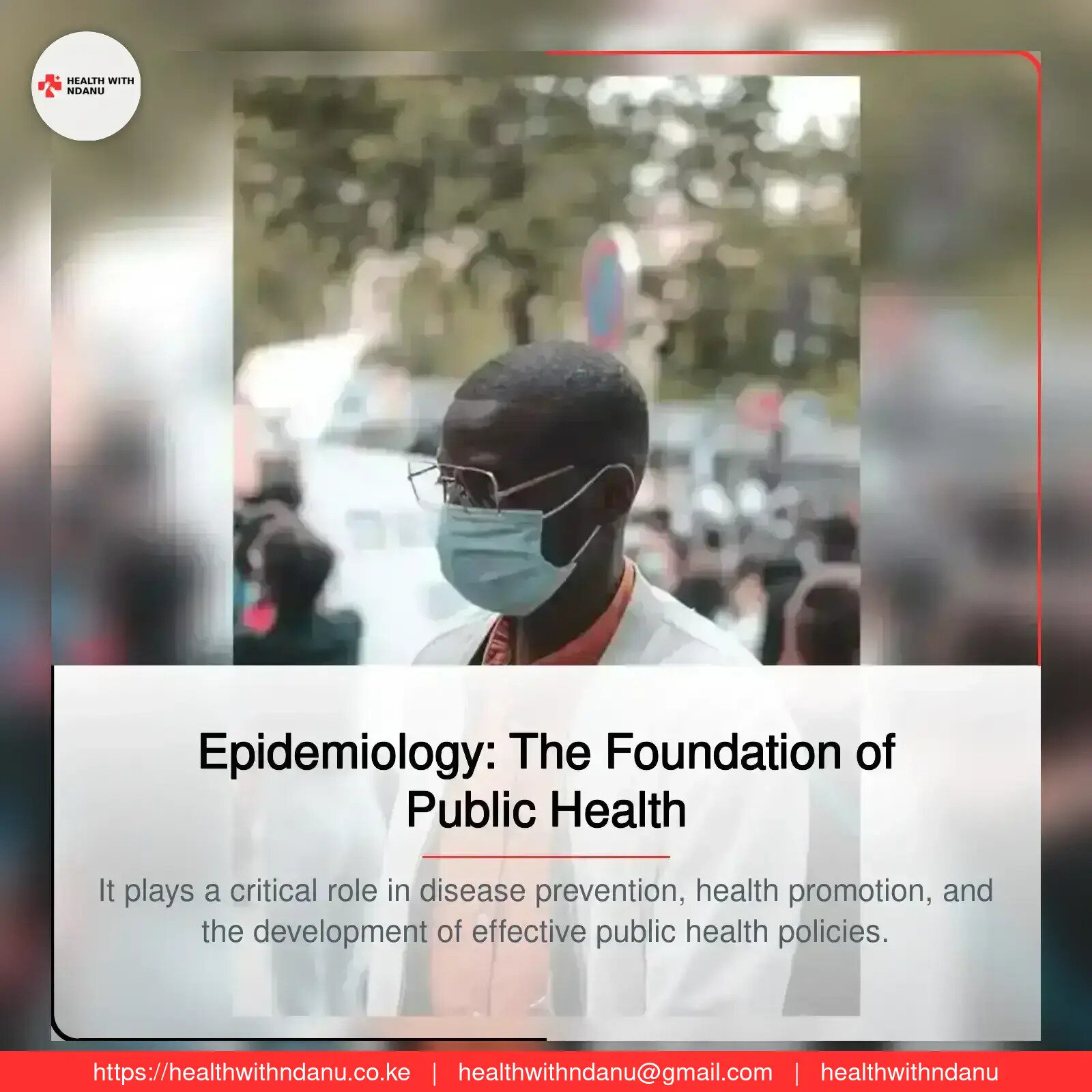Epidemiology: The Foundation of Public Health
- by Diana Ndanu
- 22 December, 2024
- 2 Comments
- 5 Mins



Introduction
Epidemiology is often referred to as the cornerstone of public health. This vital discipline studies the patterns, causes, and effects of health and disease conditions in populations. It plays a critical role in disease prevention, health promotion, and the development of effective public health policies.
In this article, we explore what epidemiology is, its importance in public health, key concepts, and how it shapes global health initiatives.
What Is Epidemiology?
Epidemiology is the scientific study of how diseases spread, who they affect, and why. It helps public health officials identify risk factors, track disease outbreaks, and evaluate the effectiveness of interventions.
Epidemiology focuses on three main aspects:
1. Distribution: Who is affected, where, and when?
2. Determinants: What causes the health event?
3. Control Measures: How can we prevent or manage the health issue?
Why Is Epidemiology Important in Public Health?
1. Disease Prevention
Epidemiology identifies the root causes of diseases, helping public health officials implement preventive measures. For instance, understanding how smoking leads to lung cancer has shaped global anti-smoking campaigns.
2. Tracking and Controlling Outbreaks
Epidemiologists are at the forefront of tracking disease outbreaks, such as COVID-19, Ebola, or malaria. They use surveillance data to predict the spread and recommend control strategies.
3. Health Policy Development
Epidemiological research informs public health policies, ensuring they are based on evidence. Examples include vaccination programs and environmental health regulations.
4. Promoting Health Equity
Epidemiology sheds light on health disparities, enabling targeted interventions to bridge gaps in healthcare access and outcomes.
Key Concepts in Epidemiology
1. Incidence and Prevalence
- Incidence refers to the number of new cases of a disease within a specific time frame.
- Prevalence is the total number of cases at a given time.
- These metrics help epidemiologists understand disease trends and evaluate intervention effectiveness.
2. Risk Factors
Epidemiologists identify factors that increase the likelihood of developing a disease. For instance, sedentary lifestyles and poor diets are risk factors for obesity.
3. Epidemiological Triangle
The triangle consists of three elements:
- Agent: The cause of the disease (e.g., bacteria, viruses).
- Host: The individual affected by the disease.
- Environment: External factors influencing the agent and host interaction.
4. Types of Epidemiological Studies
- Descriptive Studies: Focus on the who, what, where, and when of health events.
- Analytical Studies: Examine the why and how of disease occurrence, often using case-control or cohort designs.
- Experimental Studies: Test hypotheses through interventions, such as clinical trials.
Applications of Epidemiology in Public Health
1. Infectious Disease Control
Epidemiology is critical in preventing and controlling infectious diseases like HIV/AIDS, tuberculosis, and influenza. By identifying transmission pathways, epidemiologists develop strategies to reduce infection rates.
2. Chronic Disease Management
Conditions such as heart disease, diabetes, and cancer are studied extensively to understand their risk factors and prevalence. Public health campaigns promoting healthy lifestyles are based on these findings.
3. Environmental Health
Epidemiology assesses how environmental factors like air pollution, water quality, and climate change impact health. This research informs policies to create healthier environments.
4. Occupational Health
Epidemiologists study workplace hazards to protect workers from occupational diseases and injuries.
5. Global Health
Epidemiology addresses global health challenges, including pandemics and health disparities between nations.
Challenges in Epidemiology
1. Data Collection and Analysis
Collecting accurate, high-quality data can be challenging due to underreporting or lack of resources, especially in low-income countries.
2. Emerging Diseases
New diseases and mutations, such as COVID-19 variants, require continuous monitoring and adaptation of existing methods.
3. Health Inequalities
Addressing disparities in healthcare access and outcomes remains a significant challenge for epidemiologists.
4. Ethical Concerns
Ensuring privacy and ethical use of data is essential when studying populations.
The Role of Epidemiology in Modern Public Health Initiatives
1. Pandemic Preparedness and Response
The COVID-19 pandemic underscored the importance of epidemiology in detecting outbreaks and guiding public health responses. Techniques like contact tracing and vaccination campaigns were grounded in epidemiological evidence.
2. Vaccination Programs
Epidemiologists design and evaluate vaccination programs to protect populations from diseases like measles, polio, and HPV.
3. Non-Communicable Disease Prevention
Epidemiological research has led to widespread awareness campaigns about the dangers of smoking, unhealthy diets, and sedentary lifestyles.
4. Behavioral Health
By studying mental health trends, epidemiologists contribute to policies addressing stress, depression, and substance abuse.
5. Climate Change and Health
Epidemiologists are increasingly involved in studying the health impacts of climate change, such as heatwaves, vector-borne diseases, and natural disasters.
Emerging Trends in Epidemiology
1. Big Data and AI
Advanced data analytics and artificial intelligence (AI) are transforming how epidemiologists analyze complex datasets, enabling faster and more accurate predictions.
2. One Health Approach
This interdisciplinary approach recognizes the interconnectedness of human, animal, and environmental health. It is particularly relevant for zoonotic diseases like avian flu.
3. Precision Public Health
Tailoring public health interventions to specific populations based on genetic, environmental, and social factors is an emerging trend.
How Epidemiology Benefits Communities
1. Empowering Individuals
By raising awareness about health risks and preventive measures, epidemiology empowers individuals to take control of their health.
2. Strengthening Healthcare Systems
Epidemiological data helps allocate resources efficiently, ensuring healthcare systems can meet population needs.
3. Improving Quality of Life
Through disease prevention and health promotion, epidemiology enhances overall quality of life and life expectancy.
The Future of Epidemiology
As the world faces new health challenges, the importance of epidemiology will continue to grow. With advancements in technology and global collaboration, epidemiologists are better equipped than ever to protect public health.
Conclusion
Epidemiology is a vital subcategory of public health that bridges science and practice to improve population health. By understanding disease patterns and their causes, epidemiologists shape policies and interventions that save lives and promote well-being.
From controlling infectious diseases to addressing chronic health conditions, the impact of epidemiology is far-reaching. As we navigate an increasingly complex world, investing in this discipline is essential for a healthier future.
Got Your Own Experience? Share with us
Popular Categories
Mablogu Zinazobambwa Sana
Daily Newsletter
Get all the top stories from Blogs to keep track.



